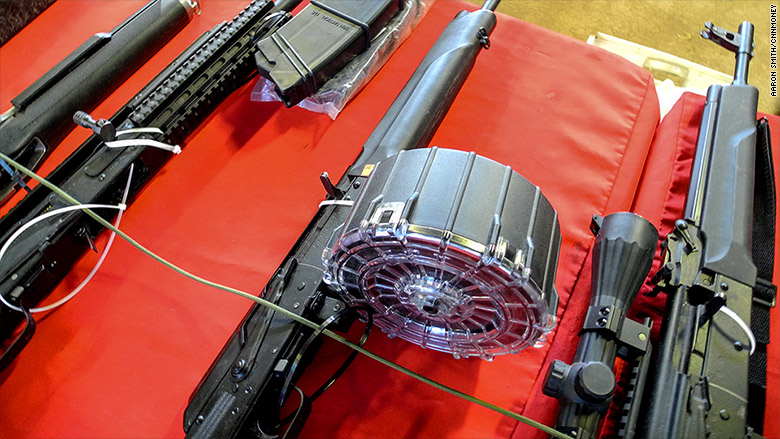
President Obama resorted to executive action this week to broaden background checks on gun buyers because his efforts to tighten controls on guns has been repeatedly thwarted by Congress.
Even outrage over the massacres in Newtown, Connecticut and Aurora, Colorado, in 2012 failed to move Washington on gun control issues.
Those heartbreaking incidents, however, have motivated states to act.
"This is a national crisis that requires a national solution," said Shannon Watts, founder of Moms Demand Action for Gun Sense in America. "We do need Congress to act. In the meantime, we're not going to wait. We're going to go state by state."
The National Rifle Association, which did not respond to a request for comment, has resisted any form of gun control on the federal or state level.
Since the carnage of Aurora and Newtown, gun control activists and state lawmakers have focused on two things: Expanding background checks and restricting high capacity magazines.
Gun capacity
On April 3, 2013, just days before Congress rejected a gun bill proposed by the president, Gov. Dannel Malloy of Connecticut signed into law a 10-round limit on magazine capacity.
A year after the Aurora massacre, Colorado lawmakers placed a 15-round limit on magazine capacity.
New York and Maryland have recently mandated 10-round limits, according to the NRA, while California, Hawaii, Massachusetts and Washington, DC, had pre-existing 10-round limits, and New Jersey caps capacity at 15 rounds.
Background checks
The FBI conducts background checks on most gun sales, but in many states sales between private individuals at gun shows are not subject to background checks. Closing that loophole has been bitterly fought over by gun control and gun rights groups.
Since the Newtown shooting, six states have mandated background checks for all gun sales, including at gun shows. They include Connecticut, Colorado, New York, Delaware, Washington and Oregon, according to the gun control group Everytown.
Related: 2015 was a record year for background checks
Overall, 18 states now impose their own background checks on handguns, said Everytown. Ten of those states and Washington DC impose their own background checks on all guns, including rifles and shotguns.
Other actions
Cities and states have taken other actions to clamp down on guns. Virginia revoked concealed carry permit recognition from 25 other states that didn't meet its own standards. And the city of Seattle passed a special tax on gun and ammunition purchases.
Backlash
The pendulum of state gun laws can swing both ways. Texas passed a law last year allowing concealed carry on college campuses. The law goes into effect Aug. 1, 2016 the 50th anniversary of the notorious University of Texas Tower sniper shooting.
Texas is the eighth state to allow concealed handguns to be carried into classrooms, dormitories and other buildings at public and private universities. The other states are Colorado, Idaho, Kansas, Mississippi, Utah, Wisconsin and Oregon.
Related: The rise and fall of the AR-15
Watts said the patchwork of state-by-state gun control laws results in a more sporadic impact than nationwide gun control.
"No state is an island except Hawaii," she said. "Guns cross state lines as easily as cars do. If your state has strong gun laws but the neighboring state does not have strong gun laws, the guns come into your state. That's called the Iron Pipeline."
Market impact
Gun control, whether administered by the Feds or the state, has the unintentional affect of driving up sales for guns and accessories that face the threat of increased restrictions.
James Malarkey, sales executive for X Products, which produces high capacity magazines including 50-round drums, said that Colorado's capacity limits had an "erratic" impact on sales.
He said sales initially got squeezed when Colorado limited the legal capacity of magazines in 2013. But this was offset by the fact that "in the final months of legal purchasing they acquired enough product to absorb three to four years worth of natural demand."
"I have a feeling that if Obama utters the phrase 'high capacity magazines' there will be a whirlwind of sales and orders that we can't fill," he said, and this would be followed by a sudden drop-off in demand.
